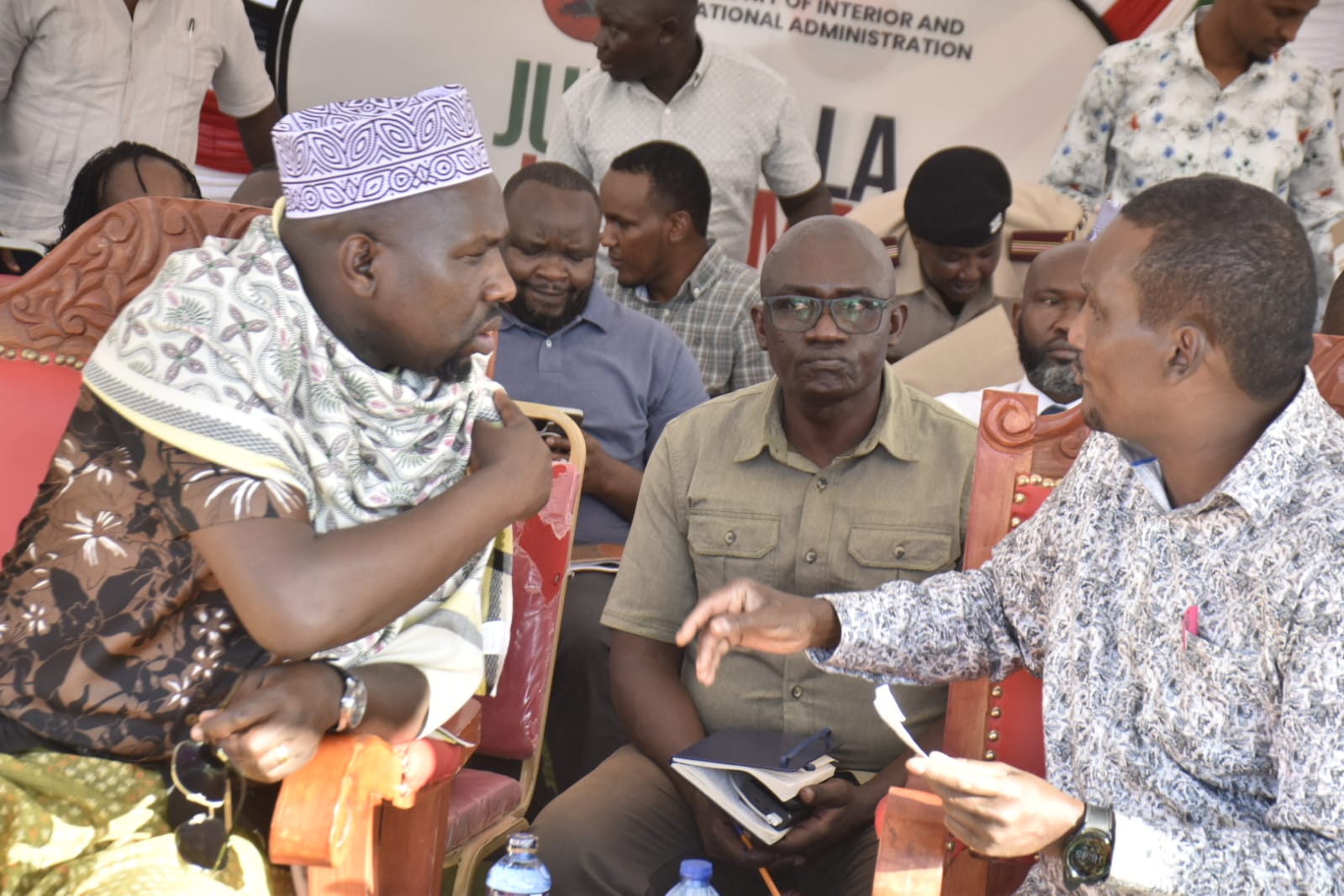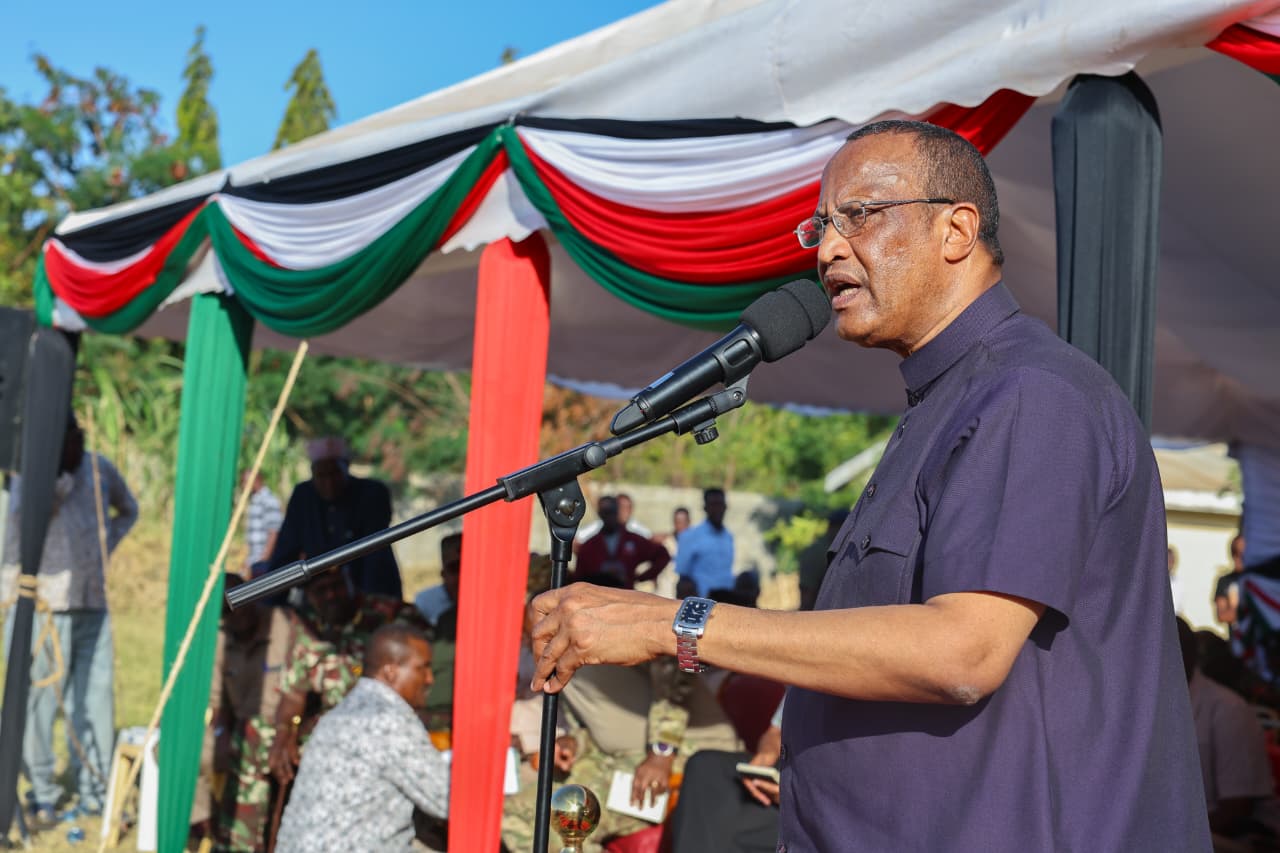
 Lagdera MP Abdikadir Hussein has a word with Interior CS
Kipchumba Murkomen during the Jukwaa la Usalama forum in Garissa.
Lagdera MP Abdikadir Hussein has a word with Interior CS
Kipchumba Murkomen during the Jukwaa la Usalama forum in Garissa.
Lagdera MP Abdikadir Hussein has urged Interior CS Kipchumba Murkomen to intervene in the human trafficking syndicate that has been going on in Garissa and ensure it is brought to an end.
Cases of human trafficking in Northeastern have risen in recent months, prompting concern among residents and leaders.
Locally known as ‘Tahrib’, the trafficking of young people to North Africa and beyond, has escalated in recent months, with desperate families selling property or falling into the traps of smugglers who often hand victims over to militia groups.
Traffickers often prey on young people and their families by offering false promises of jobs or education to the Middle East, South Asia, and parts of Europe, exploiting their desperation for better opportunities.
Speaking in Garissa during the Jukwaa la usalama forum, Hussein said the CS's direct involvement in the matter is necessary if the issue is to be addressed permanently.
Hussein, whose constituency is one of the most affected, said what has been happening in the county is not only heartbreaking but also tearing apart the fabric of society.
“These criminals are targeting our most vulnerable — our youth — luring them with false promises, only to exploit and subject them to untold suffering. As leaders, we sometimes feel helpless when we see these things happening,” he said.

“Your
intervention will send a clear message to the perpetrators and to the public at
large that the government will not sit back and watch while our young people
are being stolen from us like is currently happening.”
Hussein
also questioned why the DCI has been unable to carry through investigations and
bring to book all those involved, calling on Mohamed Amin (who was present at the
meeting), to give the matter the seriousness it deserves.
“I have
honestly been struggling to understand why the DCI has been unable to handle this
issue for this long. My appeal is, please treat this issue with the seriousness
it deserves. The time for passive investigations and empty reports is over. Let the culprits be arrested and taken to court,” he said.
At the
meeting held at the regional commissioner’s residence, parents whose children
have fallen victim to the human trafficking syndicate, narrated their ordeals as
the CS keenly listened.
Murkomen instructed
the security agencies to work together and crack down on the syndicate and ensure all those involved are brought to book.
He urged the police to remain vigilant and act firmly against such acts, saying the government has the obligation to ensure its citizens are safe.
Murkomen
further announced the revival of all regional police training centres, saying they would go a long way in enhancing the effectiveness of security operations
nationwide.
He said
the initiative will equip law enforcement officers with specialised skills to
counter region-specific challenges, including terrorism, banditry and
inter-clan violence.
Present
were Garissa Governor Nathif Jama, county assembly speaker Abdi Idle,
MCAs and other leaders.
During his tour, he was accompanied by the Inspector General of Police Douglas Kanja, Deputy Inspector General, Administration Police Service Gilbert Masengeli, DCI boss Mohamed Amin, GSU Commandant Ranson Lolmodooni, Principal Administrative Secretary Beverly Opwora, Ipoa chairman Issack Hassan, Nacada CEO Anthony Omerikwa, Secretary National Registration Christopher Wanjau, Northeastern regional commissioner John Otieno, regional police commander Pepita Ranka, regional AP commander Abdi Argamso and county commissioner Mohamed Mwabudzo.
INSTANT ANALYSIS
The International Organisation for Migration has also flagged
Kenya as a source, transit and destination for human trafficking. According to
the IOM, many children are trafficked domestically for domestic work, street
begging and sexual exploitation. Internationally, youth from northern and
coastal Kenya are trafficked to the Middle East, South Asia and parts of Europe
through fake recruitment schemes. “The crisis is further complicated by
poverty, limited access to education, and weak enforcement of laws,” the IOM
said in a recent statement.













